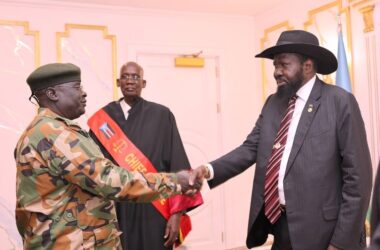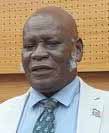By Bida Elly David
Parliament has paused deliberations on the contentious National Security Bill, pending further review and scrutiny.
The bill, initially presented by Justice Minister Ruben Madol in August, was passed by parliament in its second and third readings but is still hanging in the August House.
Parliament spokesperson John Agany said that the bill is a technical document requiring further review before it can be submitted to the House for passing.
“The national security bill is technical and a bill that deals with your life. We have to make sure that this law has been clearly scrutinized,” he told journalists on Wednesday.
He said rushing with the national security law could jeopardize the parliament’s ability to thoroughly draft key areas in the document.
“We need to make the law neutral. If we don’t make it neutral, it can even backfire on you,” he stated.
Agany mentioned there are some articles in the Bill that contradict the role of national security for the nation and civilians.
“One of the questions was article 54 and 55 granting the national security elements to arrest anybody in South Sudan,’’ he added
Agany said there is a need to critically examine the roles of national security and police in handling civil crimes.
“Some people are saying it is not good for the national security to arrest people only the police but also at the same time there are crimes which are done against the nation like treason,” he said.
“When you plan to make a liberation struggle to rebel against the system, which is to arrest you, is it the police or the national security?
The lawmaker said there is a need to clearly understand the division of security responsibilities to avoid skepticism.
“As a person with a correct mind, there are security issues that are divided. Some are of police nature and some are having also a national security nature because they concern the nation and the state so no need to hurry,” John said.
But James Boboya, a political analyst commended the delay in the passing of the bill based on the fact that it is very controversial in many aspects in South Sudan.
“One of the aspects is the public interest when it comes to mobilization of people when it comes to participation of democratic process of participating in events that are none political or political,” Boboya said.
The analyst stated that comprehensive and fundamental attention needs to be given to the bill’s provisions to ensure a clear understanding and comprehension for all parties involved.
“This is the very bill that has brought issues that if you want to organize an event you must get permission from the national security this is undemocratic and unlawful,’’ he added.
Boboya emphasized that the bill should address the contradictions of arresting people without a warrant and the power of arrest.
“This bill has to scrap it all so that the power of arrest rests with the police noting that the police have constitutionally been the only entity to arrest, protect property and bring about order to the society,” he echoed.
He suggested that lawmakers should thoroughly examine the bill to comprehend the proper application of their powers.
“They should understand how it can be shielded so that national security doesn’t come back to that particular function of arresting people without arrest of people without warrant,” Boboya suggested.
“There is a need to do research with intelligence and pass it to institutions that are mandated to arrest and prosecute. Understanding that bill is important that is why it has to be delayed.”




